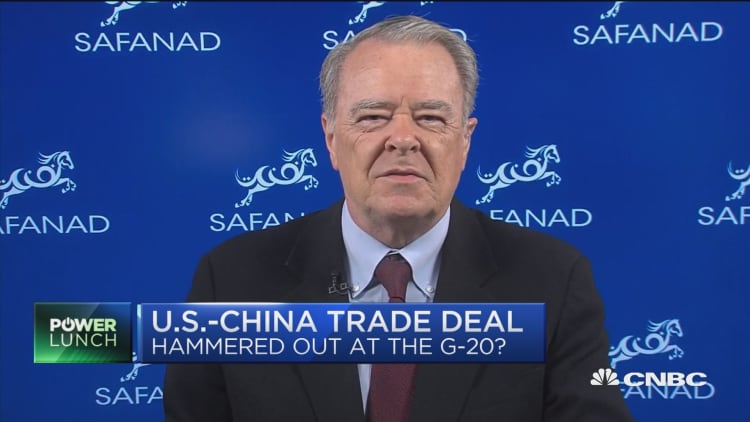
President Donald Trump's political troubles don't bode well for a resolution to the U.S.-China trade war, John Rutledge, a principal architect of Ronald Reagan's economic plan, told CNBC on Thursday.
"The political difficulties here make Trump do bad policy, which is more protectionism," he said on "Power Lunch."
Trump is set to have dinner with Chinese President Xi Jinping later this week at the G-20 summit in Argentina. Trade is expected to be among the topics discussed.
The meeting will occur just days after Trump's ex-lawyer, Michael Cohen, pleaded guilty to lying to Congress about a Trump real estate project in Russia, as well as the extent of the president's knowledge and involvement in the deal, which never came to fruition.
The plea in federal court Thursday is Cohen's second and is part of a new deal with special counsel Robert Mueller. After the hearing, Trump told reporters on the White House's South Lawn that Cohen was lying in his latest plea to "get a reduced sentence."
"The more we see Cohen and impeachment talks in the news, the more we're going to see Trump act like a tough guy because that'll make his base more excited in trying to defend him," said Rutledge, also a former advisor to President George W. Bush.
"That's bad for the trade dispute."
In September, the Trump administration announced new 10 percent tariffs on $200 billion of Chinese goods. If the two sides fail to reach a truce for 2019, the levies will climb to 25 percent.
According to The Wall Street Journal, the U.S. and China are exploring a trade agreement that would stop further tariffs from Washington in exchange for new talks about changes to Beijing's economic policy.
On Thursday, Trump told reporters, "I think we're very close to doing something with China but I don't know that I want to do it."
In the end, Rutledge, now chief investment officer at Safanad and a CNBC economics contributor, expects a "verbal solution, not a tariff solution" from the Trump-Xi meeting.
He also thinks that the inclusion of China trade hawk Peter Navarro at the dinner is "not a good sign." The White House trade policy advisor has taken an aggressive stance toward changing the U.S. trade relationship with China.
Earlier this month Navarro said any potential deal will be on Trump's terms, not Wall Street's terms. However, the president's top economic advisor, Larry Kudlow, later said Navarro was not speaking for the president nor the administration.
— CNBC's Kate Rooney and Kevin Breuninger contributed to this report.


